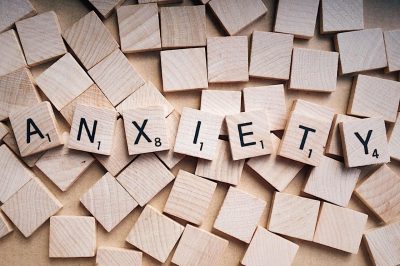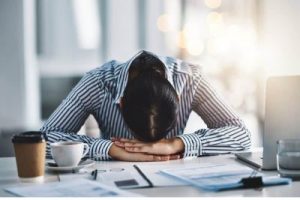According to the Merriam-Webster Dictionary, “Anxiety” is defined as:
- apprehensive uneasiness or nervousness usually over an impending or anticipated ill
- medical: an abnormal and overwhelming sense of apprehension and fear often marked by physical signs (such as tension, sweating, and increased pulse rate), by doubt concerning the reality and nature of the threat, and by self-doubt about one’s capacity to cope with it
- mentally distressing concern or interest
- a strong desire sometimes mixed with doubt, fear, or uneasiness
Even taking the dictionary definition, we get a sense of anxiety being a common occurrence. We also get a sense of it becoming something that can adversley impact our lives.
You would likely have been through school and gone into your working lives without having had any sort of mental health education. As a result, we generally don’t know how to spot when anxiety is a problem and either leave it too late to seek help or find out the hard way when everything starts falling down around us.
Should I be concerned with my anxiety?
Anxiety is normal. It is a normal reaction to things that stress or worry us. It is beneficial in some situations, alerting us to the dangers of certain situations. It can help us focus and prepare for what is ahead. But sometimes, for some people, it just doesn’t seem to work as originally intended.
While reading this article, you may recognise some of your symptoms in what we describe. You’ll know these feelings well, as they are often associated with events such as going for an interview, into a hospital, go on a plane or awaiting your exam results. You may even know them if you have been through relationship problems or had financial difficulties.
However, anxiety disorders differ from those normal feelings, in that the feelings can be more frequent and more intense. When your anxiety and mental health start to affect your ability to function properly, it is time to seek help. Anxiety can affect your relationships, work, happiness and physical health if left untreated.
What does anxiety disorder feel like?
Anxiety disorder can be felt both in terms of our mood and feelings, as well as through physical symptoms. It is important to understand before we proceed that these symptoms can be managed with professional help, and some will be able to manage their anxiety themselves through improved self-care and other coping techniques.
Almost everyone experiencing anxiety disorder will describe it differently, but all will generally have certain things in common.
A list of the effects on the body might include:
- Feeling light-headed and dizzy
- A churning feeling in the stomach
- Nausea, feeling sick
- Restlessness, difficulty sitting still
- Rapid breathing
- Panic Attacks
- Thumping regular heartbeat
- Aches – Headaches, backaches, etc..
- Pins & needles
- Hot-flushes & sweating
- Sleeping problems
- Low of sex-drive
- Grinding teeth – especially at night
What are the symptoms of an anxiety disorder?
Excessive Worrying
Many of those affected by anxiety disorders will find that the worrying is excessive and disproportionate to the events that are triggering the worries.
Most people will occasionally ‘blow things out of proportion’ – a saying we have all heard. But to be diagnosed as an anxiety disorder, the excessive worrying will usually have occurred for a prolonged period. The worrying will also likely be intrusive, affect the ability to carry on normal daily lives, and possibly interfere with work or relationships and possibly affect sleeping and eating.
Rumination can be a particular form of worry. Thinking over past events replaying them frequently. Or going over and over the same thoughts time after time. You may find yourself worrying over future events, going through a long list of “what-if’s”.
You may be busy worrying about worrying too much, being anxious about being anxious, or of people seeing that they are anxious. The anxiety that comes with worrying that you can’t stop being anxious can in of itself have a significant impact on an individual.
Feeling Agitated
When someone feels worried, they can often immediately feel one or more of a series of symptoms throughout the body. These can include sweaty palms, a raised heartbeat, shaking hands and even a dry mouth. This is the sympathetic nervous system kicking in. These symptoms reflect the body sensing danger and preparing it to react to the threat. For people with anxiety these sensations can last for some time, way beyond the initial ‘threat’ that the body responded to.
Restlessness
Feeling “on edge”, fidgety and continually needing to move or reposition are frequently reported symptoms of anxiety disorders. Feelings of restlessness will affect most of us from time to time, but when these feelings last for long periods or happen on most days, then it can be useful to see a Doctor or a mental health professional.
Fatigue
People with anxiety often complain of feeling tired frequently or that they fatigue quickly. For some, the fatigue will only affect them after they’ve experienced an anxiety attack, but for others, it can occur much more regularly than that.
When increased levels of tiredness coincide with excessive worrying, it can be an indicator of anxiety.
Increased fatigue above normal levels for the individual can occur for a multitude of reasons. A lack of proper sleep or poor nutrition can contribute to tiredness. But given the range of mental and physical health conditions that can show up as fatigue, it is recommended to see a GP or mental health professional.
Difficulty Concentrating
People affected by anxiety regularly report having difficulty concentrating and of losing focus on their work or studies. Generally speaking, the worse the level of excessive worry, the greater the reported difficulty concentrating. It has also been reported that our performance can reduce as anxiety increases.
Difficulties concentrating can be due to any number of things. We have all gone through it from time to time as worries come and go. As well as anxiety disorder, there can be other conditions that can impact concentration such as attention deficit disorder or depression, so on its own is not enough to confirm anxiety.
Irritability
Irritability is a common symptom of generalised anxiety disorder.
Those affected by anxiety, frequently report being easily and disproportionately upset, some even find themselves getting angry more frequently.
Unfortunately, commonly, this irritability shows up most around those closest to the person affected. Along with other symptoms, irritability, or frequent and increased levels of arguments with loved ones or close friends can reflect a persons increased levels of anxiety.
Tight or Tense Muscles
Most of us have come to learn that our stress can sometimes be reflected in tight, tense muscles. Similarly, this can be true with anxiety. Constant aches, pains or tension in muscles can be an indicator that anxiety disorder is present.
Trouble sleeping – falling or staying asleep
Disturbed sleep is a common symptom of anxiety disorders.
Some people will find it hard to get to sleep, while others will fall asleep quite naturally but then wake suddenly some hours later and find it difficult to get back to sleep.
The relationship between insomnia and anxiety isn’t yet fully understood, even though we know there is a strong link. What we do know is that when anxiety is managed successfully, sleep patterns are generally seen to improve. It is not uncommon for people with sleep issues who go to their doctor to be referred to a mental health professional, given the prevalence of anxiety as a cause.
Panic Attacks
Panic Attacks can be seen in people with a variety of anxiety disorders. They generally produce intense and overwhelming sensations of fear that can be debilitating for those affected.
Panic Attack symptoms may include a rapid heartbeat, sweating, shaking, chest tightening, difficulties breathing, nausea, fears of dying or of losing control.
For some, the symptoms can be mild or pass quickly. But, for others, the symptoms can be extreme and prolonged. Those affected by panic attacks, particularly when they first happen may sometimes taken to the Emergency Unit for checks on their heart and respiratory systems. Such is the physical impact of the anxiety being experienced.
Social situations
People affected by anxiety can find themselves struggling in situations where they are meeting or amongst people, or go to places that they aren’t familiar with. Social forms of anxiety can even impact those meeting people they know well in places they like.
Indicators can include:
- Feeling anxious or worried in the lead-up to appointments.
- Cancelling appointments frequently at the last minute without good reason.
- Fears of being judged or criticised by others
- Working about being embarrassed or humiliated by others or yourself.
- Avoiding certain events, locations or people.
People with social anxieties can often appear shy and lacking in confidence, mirroring the turmoil that is going on inside them.
However, others have learned to cope and might seem highly social and highly functional despite how they feel – in some cases, they may even be over-compensating for their feelings.
What if I display one or more of the symptoms listed above?
Firstly, there is no need to worry further is you recognise some of your own symptoms here. Identifying the potential indicators for anxiety can help you now get any help that you need and prevent the impact being greater.
Anxiety is very common. People who have anxiety are normal. They often function very effectively and can lead very happy lives achieving their goals
As you will see in future articles, there are many ways to help yourself, through self-care and coping mechanisms. Many of these are very simple, and you may already be familiar with them.
For some, they will benefit from seeing a mental health professional. In certain circumstances, they may benefit from medication to ease the impact of the symptoms that they are feeling. For many, the help of a qualified Counsellor can provide the support that they need. Counsellors can help you understand how you are feeling, what triggers it, how to recognise the symptoms, and how to cope with it.
As we’ll see in coming articles, there is a lot that can be done to eradicate or reduce the impact of the anxiety-related symptoms that you may be experiencing.
You can also contact Aspire Counselling for in-person or secure online video counselling.
Maria Luedeke at Aspire Counselling, Singapore is a qualified Counsellor who works with people wanting to improve their mental health. Maria is highly experienced when it comes to anxiety and can utilise a number of techniques to help you. Maria works with both adults and adolescents, needing help and support for anxiety and other issues. Maria is available to provide support and guidance both face to face and over secure video counselling, working both locally and internationally.





